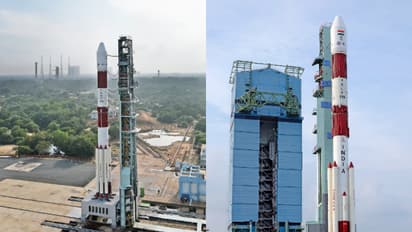ISRO to launch ESA's Proba-3 mission from Sriharikota today for groundbreaking solar research

Synopsis
ISRO's PSLV-C59 rocket will launch ESA's Proba-3 spacecraft, consisting of two satellites, to study the Sun's corona by creating an artificial solar eclipse, marking a significant milestone in ISRO-ESA collaboration.
Sriharikota: The Indian Space Research Organisation (ISRO) is set to launch the European Space Agency's (ESA) Proba-3 spacecraft today for an important solar mission. The launch is scheduled for 4:08 PM from the Satish Dhawan Space Centre in Sriharikota, Andhra Pradesh, aboard ISRO's PSLV-C59 rocket. This launch marks a significant milestone in the collaboration between ISRO and ESA.
Also Read: Mangaluru International Airport receives bomb threat in Rameshwaram cafe blast style
The PSLV-C59 rocket will carry two satellites, built by ESA, into space. The mission involves a unique setup, where two spacecraft – the Coronagraph and the Occulter – will be sent together as part of the world's first precision formation flying mission. Weighing a combined 550 kg, these satellites will operate in tandem to study the Sun's outermost and hottest atmospheric layer, known as the corona.
“PSLV-C59, showcasing the proven expertise of ISRO, is ready to deliver ESA’s PROBA-3 satellites into orbit. This mission, powered by NSIL with ISRO’s engineering excellence, reflects the strength of international collaboration. A proud milestone in India’s space journey and a shining example of global partnerships," ISRO posted on X.
The mission's key objective is to study the Sun's corona by creating an artificial solar eclipse. This will be achieved by positioning the Coronagraph and Occulter satellites in such a way that one spacecraft blocks the Sun's light from the other, enabling detailed observations. The satellites will maintain a distance of approximately 150 meters, demonstrating the advanced capabilities of ISRO's PSLV rocket.
Proba-3 will provide vital insights into the Sun's corona, which remains a largely unexplored area in solar science. The mission highlights the growing strength of India's PSLV launch vehicle and showcases ISRO’s ongoing progress in the global space exploration arena.
Stay updated with the Breaking News Today and Latest News from across India and around the world. Get real-time updates, in-depth analysis, and comprehensive coverage of India News, World News, Indian Defence News, Kerala News, and Karnataka News. From politics to current affairs, follow every major story as it unfolds. Get real-time updates from IMD on major cities weather forecasts, including Rain alerts, Cyclone warnings, and temperature trends. Download the Asianet News Official App from the Android Play Store and iPhone App Store for accurate and timely news updates anytime, anywhere.